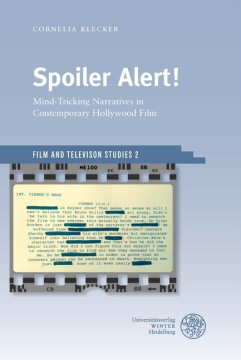
BUCH
Spoiler Alert!
Mind-Tricking Narratives in Contemporary Hollywood Film
Film and Television Studies, Bd. 2
2015
Zusätzliche Informationen
Bibliografische Daten
Abstract
“Mind-tricking narratives almost redefine the concept of spoilers.” Films with a surprise ending have become rather frequent in recent years. They are particularly interesting when they offer one plot that contains two storylines, though the second story becomes apparent only in retrospect after this twist ending. The author calls these mind-tricking narratives. This volume contributes to recent discussions of complex storytelling in film by naming, classifying, and deftly analyzing the “mind-tricking narrative” that is a more precise filmic category than the “twist” or “puzzle” film that other film scholars have identified. The list of films belonging to this category include M. Night Shyamalan’s ‘The Sixth Sense’ (1999), David Fincher’s ‘Fight Club’ (1999), and Christopher Nolan’s ‘The Prestige’ (2006). It also successfully challenges the widespread belief that popular culture equals dumb entertainment and draws upon traditional narratology and cognitive film theory to serve this end.
Inhaltsverzeichnis
| Zwischenüberschrift | Seite | Aktion | Preis |
|---|---|---|---|
| Cover | C | ||
| Titel | 3 | ||
| Impressum | 4 | ||
| Table of Contents | 5 | ||
| Acknowledgements | 7 | ||
| 1 Introduction | 9 | ||
| 2 Mind-Tricking Narratives: Between Classical and Art-Cinema Narration | 17 | ||
| 2.1 A Matter of Complex Narrative | 17 | ||
| 2.2 Hollywood and Complex Storytelling | 17 | ||
| 2.3 Approaching Mind-Tricking Narratives | 26 | ||
| 2.3.1 The ‘Deceiver’ | 30 | ||
| 2.3.2 Devices of Deception | 31 | ||
| 2.3.3 Awareness of Deception | 32 | ||
| 2.4 Classical Narration versus Art-Cinema Narration | 35 | ||
| 2.5 Concluding Remarks | 37 | ||
| 3 Manifestations of Mind-Tricking Narratives: Some Case Studies | 39 | ||
| 3.1 Eternal Moonshine of The Simpsons’ Version of a Mind-Tricking Narrative | 39 | ||
| 3.2 “Are You Watching Closely?” The Prestige versus The Illusionist | 46 | ||
| 3.3 Authentication Authority and Narrative Self-Erasure in Fight Club | 56 | ||
| 3.4 Reversing Cause and Effect: Memento | 78 | ||
| 4 The Sophistication of the Viewer: How We Have ‘Learned’ to Understand Complex Narrative | 89 | ||
| 4.1 The Concept of Time in Narrative | 90 | ||
| 4.2 Montage in Avant-Garde Film | 99 | ||
| 4.3 21 Grams – A Case Study | 104 | ||
| 4.4 The Postmodern Concept of Time | 110 | ||
| 4.5 Why Postmodernism Is NOT the ‘End of Everything’ | 115 | ||
| 4.6 Pulp Fiction – A Case Study | 120 | ||
| 4.7 The Television and MTV Generation | 127 | ||
| 5 Don’t Spoil the Ending! A Cognitive Approach | 131 | ||
| 5.1 Cognitive Film Theory | 133 | ||
| 5.1.1 David Bordwell’s Model | 133 | ||
| 5.1.2 Edward Branigan’s Model | 142 | ||
| 5.2 “The Kansas City Shuffle” – Lucky Number Slevin | 146 | ||
| 6 Conclusion | 155 | ||
| 7 Bibliography | 159 | ||
| 8 Appendix: Sample List of Mind-Tricking Narratives in Film | 171 |


 Publishing Platform by CloudPublish
Publishing Platform by CloudPublish